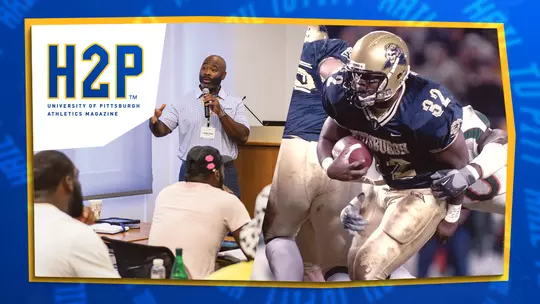
Former Athletes Find Careers in the Business World of Sports
Craig Meyer
Every year, hundreds of Pitt athletes leave the place they’ve called home for the past several years and enter the broader, sometimes uncertain professional world. Throughout their lives, these young people have been defined at least in part by the sports in which they excel. Even if they continue playing in a professional league domestically or internationally beyond graduation, the ball eventually stops bouncing or rolling. At that point, they’re faced with an age old question: What’s next? For at least some former athletes, that next step takes them to a familiar destination. A slew of former Pitt athletes has left the courts and fields on which they once played and found careers in the business side of the world of sports. Though no longer under the bright lights of competition, these individuals work diligently behind the scenes with professional leagues, individual franchises, university athletic departments and other sports-related entities to make sure the feats of athleticism that entertain and inspire countless people are possible. Here are some of their stories.
Marcus Bowman
(BUS ’06, ’10G)
Nearly 20 years later, Marcus Bowman can still remember the moment when he received an offer to join Pitt Athletics.
While traveling in Europe with his then girlfriend (now wife) following their graduation from Pitt in 2006, Bowman received an email from Donna Sanft, then his alma mater’s executive associate athletic director, who he had known during his time as a student and men’s basketball player. A position in the business office of the Pitt Department of Athletics had opened up, and she wanted to know if he would be interested.
It was the metaphorical open door that led Bowman to a successful career working in college sports administration. He’s now in his fourth year as the deputy athletic director for business strategy and chief financial officer at the University of Oklahoma.
Working under Joe Castiglione, one of the country’s longest tenured and most respected athletic directors, Bowman oversees the Sooners’ fiscal and business strategy, the development and monitoring of operating and capital budgets, and the university’s transition from the Big 12 Conference to the Southeastern Conference, among other responsibilities.
“I kind of always thought if I could combine my love and passion for sports with my educational background in school—which was business and finance—that I would have a career and a profession, not just a job,” Bowman says. “There’s a difference between the two.”
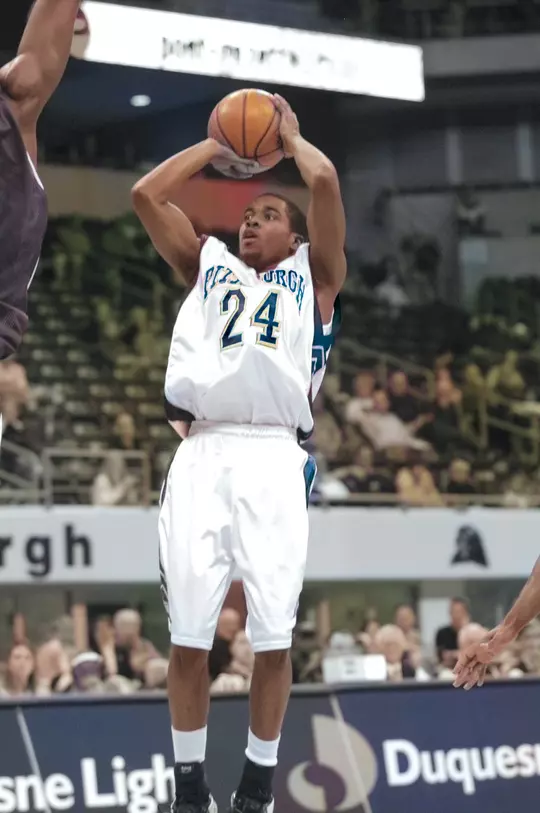
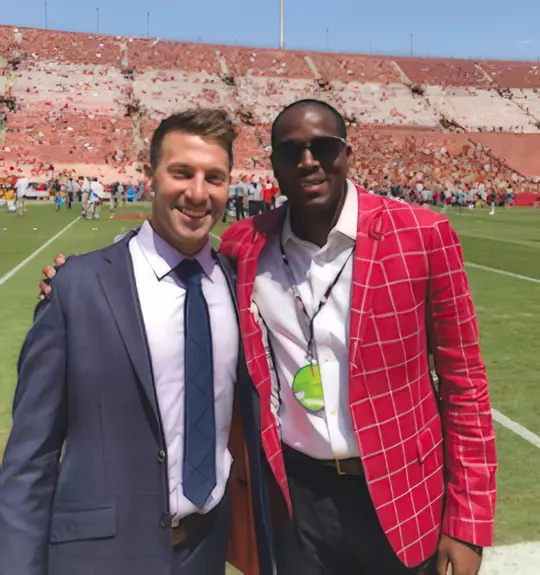
Those dual loves Bowman referenced were fortified at Pitt, where he earned a degree in business administration on a full academic scholarship while playing four seasons with the Panthers basketball team from 2002 to 2006, when it was one of the sport’s dominant programs nationally. With his business background, he was offered a job at PNC Financial Services Group, Inc., where he had interned the summer between his junior and senior years, but once the opportunity with Pitt Athletics arose, he began doubting whether he wanted to spend the rest of his life as a banker.
Ultimately, he interviewed for and was offered the position Sanft had emailed him about and began working for Pitt Athletics as its director of business operations.
“To have the opportunity for your first job to work at your alma mater in sports—to say that was a dream come true, that probably would be an understatement,” Bowman says. “It meant everything.”
Working with many people with whom he had a preexisting relationship, Bowman immersed himself in his new role. It was an educational experience. Though he had been an athlete, Bowman admittedly had no idea of everything that went into events he once took for granted, like hosting a basketball or football game. Wanting to learn more, Bowman says that he became “a sponge,” regularly volunteering himself for tasks outside his job description.
That drive helped him to earn a series of promotions, culminating in the position of senior associate athletic director for sport administration. Though he left Pitt in December 2017 for the University of Nevada, Las Vegas, where he spent three years as the senior associate athletic director and chief financial officer before moving on to Oklahoma, Pitt remains close to his heart.
“My time working at Pitt, it was life changing,” he says. “It set me up for so much. Pittsburgh, the city, is just amazing. I met my wife there. I got married. Two of my kids were born there. It will always have a special place in my family’s heart. I still root like hell for them. I want to see them do so well and be so successful in everything they do. I’ll always be a Pitt Panther.”
Katie O’Rourke
(CGS ’14, BUS ’16G)
Katie O’Rourke is no stranger to pressure.
A Pitt gymnast from 2010 to 2014, O’Rourke was regularly asked to pull off athletic feats that are unimaginable to the average person while upholding the lofty expectations she had for herself. If you can successfully land a flip on a 4-inch-wide balance beam, virtually any other challenge that gets thrown your way seems easy by comparison.
It’s those experiences that she carries with her in her current position as the senior manager of game presentation for the Washington Nationals.
“It puts it all back into perspective,” O’Rourke says. “It really kind of molded me into who I am [in that I was] able to take those seconds to realize, OK, something might have gone wrong, but where can we pivot to fix it, not freak out about it, and keep our cool? Having that background has helped me tremendously in this role.”
After receiving an ACC postgraduate scholarship following a gymnastics career in which she competed at the NCAA regional championships three times, O’Rourke continued at Pitt, earning her MBA while working in the athletics department. During that time, her next step in life became clear.
“I knew I wanted to work in sports, and I knew I liked marketing, but I just didn’t know past that about the ins and outs of what actually exists within the sports world,” she says. “That [earning an MBA while working in Pitt Athletics] opened my eyes.”
The Springfield, Virginia, native moved back home to the Washington, D.C., area after earning her MBA and began working part time in partnerships for Monumental Sports & Entertainment, the company that owns the Washington Wizards, Washington Capitals and Washington Mystics. In 2017, she joined the Nationals, with whom she assumed her current role in March 2024, after working part time for years.
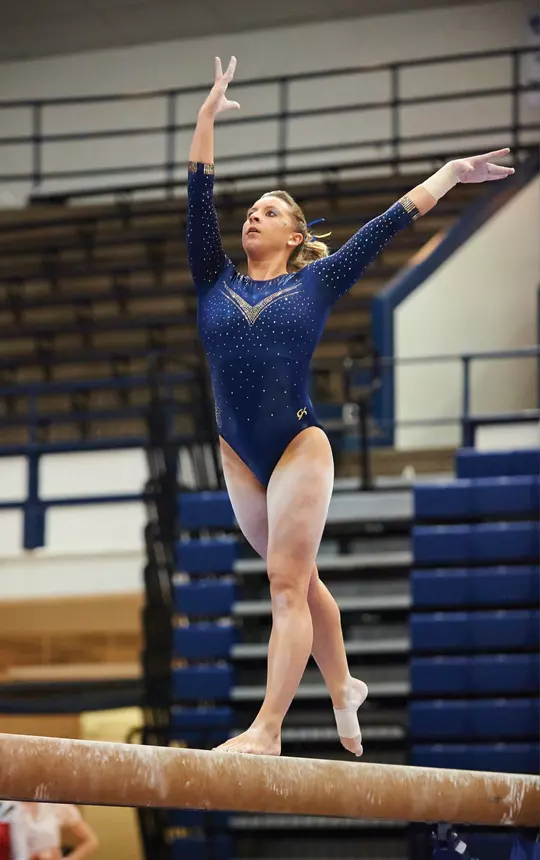
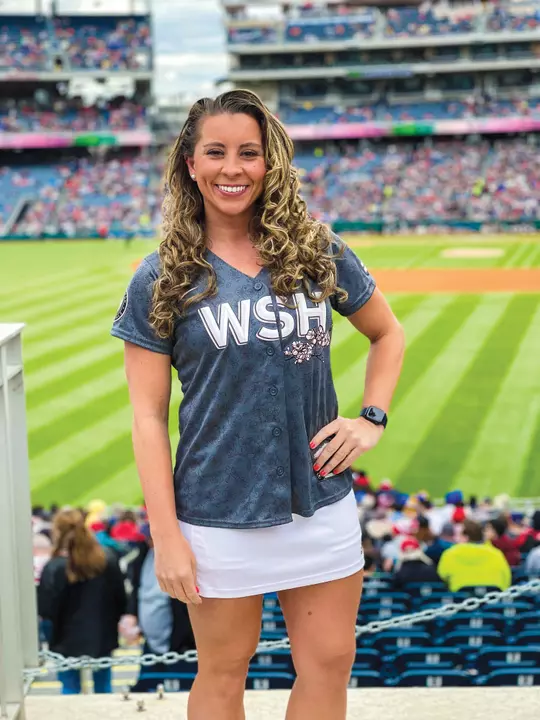
With the Nationals, who won the World Series in 2019 while she was with the organization, O’Rourke balances a variety of tasks. She oversees the NatPack, the entertainment team that selects fans at the ballpark to play games and hands out free swag like t-shirts. She works with the Nationals’ racing presidents—like the pierogy race at PNC Park, only with people wearing costumes of former U.S. heads of state—bullpen cart drivers, ball girls and mascot handlers, the last of whom are jokingly referred to as “the secret service.” She books singers to perform the national anthem and “God Bless America.” She even works with the military to coordinate stadium flyovers for special games.
If it sounds like a lot, it’s because it is. How, exactly, does O’Rourke do it? The answer can be traced back to her Pitt gymnastics career. As a gymnast, O’Rourke said she was taught to have a “goldfish brain,” a short memory that doesn’t allow her to be inflated by past success or weighed down by recent failures. Along with that, she routinely thinks back to a slogan the Panthers had during her time with them: “commitment, teamwork and pride,” all traits and ideals she works every day to embody both personally and professionally.
“I kind of had to jump in with both feet and drink from the fire hose, but in this industry, I feel like that’s how you learn,” O’Rourke says. “Being able to keep my cool, I credit all of that to being an athlete and everything I learned at Pitt.”
Lousaka Polite
(CGS ’15)
The person on the other end of each call Lousaka Polite makes every day at his job is someone he knows well.
After all, it’s him—or at least some version of him.
As the director of outreach for The Trust (Powered by the NFLPA), Polite is responsible for reaching out to every eligible former NFL player with two or more credited seasons to ensure they’re aware of benefits they’ve earned through their time of service, as mandated by the league’s collective bargaining agreement. Once they’ve learned of those available benefits, they can enroll to receive them.
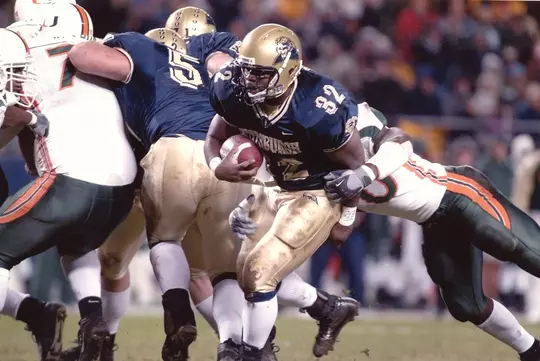
Launched in 2013, The Trust, in its own words, was launched to “provide former players with the support they need to succeed in life after football.” Polite was once in the position of needing that support himself. A bruising running back at Pitt from 2000 to 2003, Polite played nine seasons in the NFL for five different franchises from 2004 to 2012, first as a running back and later as a fullback. Polite can still remember the lingering feeling of uncertainty he felt even before his career ended as he worried what the next phase of his life might entail.
“I came to grips early that I wasn’t going to retire with a big announcement and a big press conference and all that,” Polite says. “That wasn’t going to be my story. I wasn’t going to have a bust in Canton, Ohio, or anything like that. My approach was one that helped me come to grips with it sooner, but that doesn’t make it any easier.”
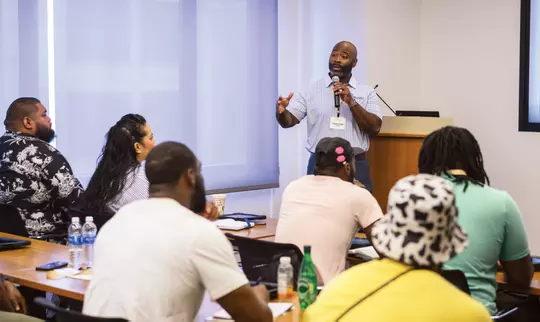
He had been interested in working in sports during his time at Pitt, where he took sports psychology courses. After planning for life after football even while he was an active NFL player, Polite immediately found work, joining one of his former teams, the Miami Dolphins, as operations coordinator for entertainment and brand impact.
After a few years there, he found his way back to Pitt, where he served as the assistant athletic director of the Varsity Letter Club and worked in the Cathy & John Pelusi Family Life Skills Program. Back at his alma mater, he leaned on his experiences as a former Pitt athlete to help a new generation of Panthers.
“I was able to leverage that credibility piece—playing in the league, going to Pitt,” Polite says. “I think that made it very easy to connect with the players and the athletes. I felt like it was my calling.” Now in his fourth year with The Trust, Polite is still guided by that calling while forming meaningful bonds with those with backgrounds similar to his own.
“When I get on the phone with a former player, [I hear] the light switch turning on, like ‘Oh, there’s so much more out there for me.’ When I see a guy has identified what he wants to be beyond the game of football, I think that’s the most rewarding piece,” he says. “For so long, we’ve been programmed to be kind of robots and just be machines and go after this thing that everyone is going after, but not everyone achieves it. Even when you do achieve it, you’re going to have to learn how to pivot and transition. What does that look like?”
Carly Thea
(A&S ’15)
This summer, the best athletes from around the world will descend on Paris, France, for the 2024 Summer Olympics, where track and field will be among the most closely monitored sports for fans in the United States and beyond. As American athletes showcase themselves to the world by sprinting 100 meters to potential glory or using a pole to launch themselves as high as 20 feet in the air, Carly Thea will be maintaining some connection to them.
As senior manager of business development and partnerships for USA Track & Field (USATF), she works diligently to elevate the sport while leaning on the valuable lessons she learned in her time as a college athlete.
“Accountability, teamwork and hard work—you learn all of those things from being a college athlete,” Thea says. “You have to be accountable for yourself on the field [and] off the field, getting all your schoolwork done while still performing on the field and playing the role you need to play for your team."
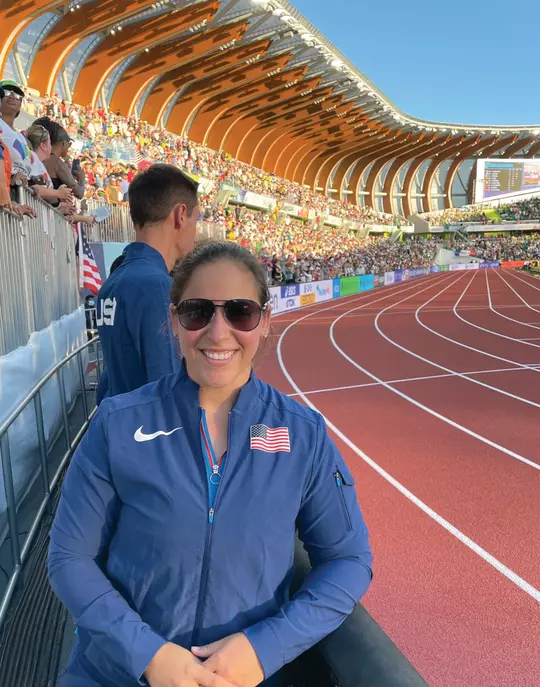
Following her playing days at Pitt, which were capped off by the Panthers’ first-ever run to the ACC softball championship game in 2015, Thea pursued a career in sports, believing it to be a space where camaraderie, passion and hard work are valued. After working as a marketing intern for Fox Sports in the Miami, Florida, area, she moved closer to her native Merrick, New York, to join the New York Yankees organization, where she worked in various roles for four and a half years.
By the end of that stretch, and right as the far-reaching effects of the COVID-19 pandemic were giving her time to reflect on her career, she realized it was time for a change.
“I wanted to continue to build my career and continue to expand my skills,” Thea says. “I think with USA Track & Field, it was honestly an interesting challenge. It’s a sport, but a different sports world because it’s a national governing body. The way it works is much different [from] a league.”
In her role, Thea deals primarily with account management and business development, the latter of which is particularly notable given that USATF is a nonprofit organization. With most of USATF’s revenue coming in from sponsorships, Thea is responsible for helping to bring in new partners and new companies. That task of forming and fostering relationships with others is one that she embraces.
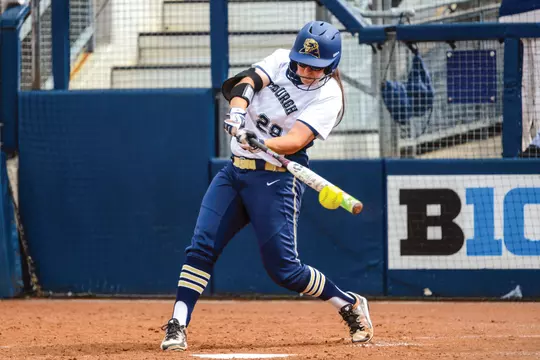
The job has offered her plenty of professional and personal highlights. Among all those, working at the 2022 World Athletics Championships in Eugene, Oregon, stands out. She worked tirelessly during the day to help make everything function smoothly, sometimes beginning at 8 a.m. and not finishing until 1 a.m., but the sheer size of the event, from the number of athletes competing to the enormity of what they were vying for, was awe inspiring. For Thea, it was a reminder of why she does what she does. “I think I’m really enjoying the fact we’re trying to grow the sport in the United States to be not just every four years when everyone thinks of it,” she says. “I think we’re on our way and taking steps toward that. There’s still plenty of work to do, but I think it will really give people another sport to fall in love with.”
